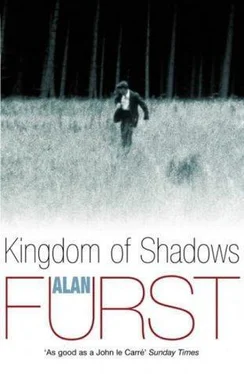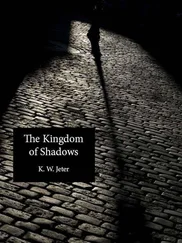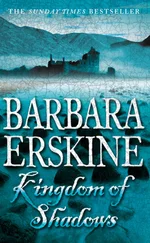Alan Furst - Kingdom of Shadows
Здесь есть возможность читать онлайн «Alan Furst - Kingdom of Shadows» весь текст электронной книги совершенно бесплатно (целиком полную версию без сокращений). В некоторых случаях можно слушать аудио, скачать через торрент в формате fb2 и присутствует краткое содержание. Жанр: Шпионский детектив, на английском языке. Описание произведения, (предисловие) а так же отзывы посетителей доступны на портале библиотеки ЛибКат.
- Название:Kingdom of Shadows
- Автор:
- Жанр:
- Год:неизвестен
- ISBN:нет данных
- Рейтинг книги:5 / 5. Голосов: 1
-
Избранное:Добавить в избранное
- Отзывы:
-
Ваша оценка:
- 100
- 1
- 2
- 3
- 4
- 5
Kingdom of Shadows: краткое содержание, описание и аннотация
Предлагаем к чтению аннотацию, описание, краткое содержание или предисловие (зависит от того, что написал сам автор книги «Kingdom of Shadows»). Если вы не нашли необходимую информацию о книге — напишите в комментариях, мы постараемся отыскать её.
Kingdom of Shadows — читать онлайн бесплатно полную книгу (весь текст) целиком
Ниже представлен текст книги, разбитый по страницам. Система сохранения места последней прочитанной страницы, позволяет с удобством читать онлайн бесплатно книгу «Kingdom of Shadows», без необходимости каждый раз заново искать на чём Вы остановились. Поставьте закладку, и сможете в любой момент перейти на страницу, на которой закончили чтение.
Интервал:
Закладка:
“Take off your tie,” Morath said.
Pavlo hesitated, then, reluctantly, pulled the knot apart.
“I’m going into the water, you follow. You hold on to one end of the tie, I’ll swim across and pull you with me. You do the best you can-kick your feet, paddle with your free arm. We’ll manage.”
Pavlo nodded.
Morath looked down at the water, ten feet below him, dark and swirling. The far shore seemed a long distance away, but at least the bank was low.
“Wait a minute,” Pavlo said.
“Yes?”
But there was nothing to say, he just didn’t want to go into the water.
“We’ll be fine,” Morath said. He decided to try for the next pole, something he could hang on to while he coaxed Pavlo to jump in after him. He pulled himself along, felt the planks beneath him quiver, then shift. He swore, heard a beam snap, was turned on his side and dropped. He fought the air, then landed with a shock that knocked him senseless. It wasn’t the icy jolt of the water, he was waiting for that. It was the rock. Smooth and dark, about two feet below the surface. Morath found himself on his hands and knees, no pain yet but he could feel it coming, the river churning around him. Hidden causeway. The oldest trick in the world.
Pavlo came crawling toward him, tie held in his hand, passport clenched in his teeth, steel spectacles askew, and laughing.
They walked to Zahony. Following first the river, then a cart track through the woods that turned into a road. It took all morning but they didn’t care. Pavlo was pleased not to be drowned, and his money wasn’t all that wet-he peeled the bills apart, Austrian, Czech, French, blew gently on the various kings and saints, then put it away in his briefcase.
Morath had hurt his wrist and knee, but not as badly as he’d feared, and had a bruise by his left eye. A plank, most likely, he never felt it happen. In time, the sun came out and light sparkled on the river. They passed a woodcutter, a tramp, and two boys fishing for the small sturgeon that ran in the Tisza. Morath spoke to the boys in Hungarian: “Any luck?” A little, yes, not too bad. They seemed not very surprised when two men in muddy clothes walked out of the forest. That’s what came from living on a frontier, Morath thought.
They found a little restaurant in Zahony, ate cabbage stuffed with sausage and a plate of fried eggs, and got on a train that afternoon. Pavlo fell asleep, Morath stared out the window at the Hungarian plain.
Well, he’d kept his word. Promised Polanyi he would bring this, this whatever-he-was to Paris. Pavlo. Certainly an alias-nom de guerre, code name, impersonation. Something. He claimed he was a Croat and that, Morath thought, just might be true. Perhaps a Croatian Ustachi. Which meant terrorist in some neighborhoods and patriot in others.
Croatia, a province of Hungary for centuries and her access to the sea-which was how Miklos Horthy came to be Admiral Horthy-had stewed up quite a bit of political history since becoming part of a manufactured kingdom, Yugoslavia, in 1918. The founder of the Ustachi, Ante Pavelic, had found celebrity by turning to a political opponent in the Croatian Chamber of Deputies and shooting him in the heart. Six months later, Pavelic returned from hiding, walked into the lobby of the chamber carrying a shotgun, and killed two more.
Under Mussolini’s protection, Pavelic moved to a villa in Turin, where he kept a guiding hand on the political philosophy of his organization: over forty train wrecks in ten years, numberless public buildings bombed, hand grenades thrown into soldiers’ cafes, and five thousand Croatian and Serbian officials murdered. The money came from Mussolini, the assassins from IMRO, Internal Macedonian Revolutionary Organization, with headquarters in Bulgaria. It had been IMRO operatives who assassinated King Alexander of Yugoslavia in 1934, in Marseilles. They had been trained in camps in Hungary which, in service of an alliance with Italy, also provided military instructors and false papers. Papers issued, quite often, in the name of Edouard Benes, the hated president of Czechoslovakia. A certain sense of humor at work there, Morath thought.
“Balkan, Balkan,” they said in France of a pimp slapping a whore or three kids beating up a fourth-anything barbarous or brutal. In the seat across from Morath, Pavlo slumbered away, arms crossed protectively over his briefcase.
The passport formalities at the Austrian border were, mercifully, not too drawn out. For Andreas Panea, the Roumanian, that particular masked rudeness of central Europe-you practically had to be Austrian to know you’d been insulted. For everybody else, it took a day or two, and by then you’d left the country.
A long time on the train, Morath thought, anxious to be back in the life he’d made in Paris. Hungarian plain, Austrian valley, German forest, and, at last, French fields, and the sun came out in Morath’s heart. By evening, the train chugged through the Ile-de-France, wheatfields and not much else, then the conductor-who was all French train conductors, broad and stocky with a black mustache-announced the final stop, just the edge of a song in his voice. Pavlo grew attentive, peering out the window as the train slowed for the villages outside the city.
“You’ve been to Paris?”
“No.”
On the tenth of May 1938, the night train from Budapest pulled into the Gare du Nord a little after 9:20 P.M. It was, on the whole, a quiet evening in Europe, cloudy and warm for the season, rain expected toward dawn. Nicholas Morath, traveling on a Hungarian diplomatic passport, stepped slowly from the first-class car and headed for the taxi rank outside the station. Just as he left the platform he turned, as though he was about to say something to a companion, but, on looking back, he discovered that whoever he’d been with had disappeared into the crowd.
VON SCHLEBEN’S WHORE
The Bar of the Balalaika,a little after three, the dusty, tired air of a nightclub on a spring afternoon. On the stage were two women and a man, dancers, in tight black clothing, harassed by a tiny Russian wearing a pince-nez, hands on hips, stricken with all the hopelessness in the world. He closed his eyes and pressed his lips together, a man who’d been right about everything since birth. “To leap like a Gypsy,” he explained, “is to leap like a Gypsy.” Silence. All stared. He showed them what he meant, shouting “Hah!” and throwing his arms into the air. He thrust his face toward them. “You, love, life!”
Boris Balki was leaning on his elbows, the stub of a blunt pencil stuck behind his ear, a half-completed crossword puzzle in a French newspaper spread out on the bar. He looked up at Morath and said, “Ca va?”
Morath sat on a stool. “Not too bad.”
“What can I get for you?”
“A beer.”
“Pelforth all right?”
Morath said it was. “Have one with me?”
Balki’s eyebrow raised a fraction as he got the bottles from beneath the counter. He opened one and poured the beer into a tilted glass.
Morath drank. Balki filled his own glass, looked down at his puzzle, flipped the page, took a look at the headlines. “Why I keep buying this rag I don’t know.”
Morath read the name upside down. It was one of the friskier Parisian weeklies: sexy gossip, risque cartoons, photos of lurid chorus girls, pages of racing news from Auteuil and Longchamps. His name had once, to his shame and horror, appeared in it. Just before he met Cara he’d been going around with a second-rank movie star, and they’d called him “the Hungarian playboy Nicky Morath.” There’d been neither a duel nor a lawsuit but he’d considered both.
Balki laughed. “Where do they get this stuff? ‘There are currently twenty-seven Hitlers locked up in Berlin insane asylums.’ “
Читать дальшеИнтервал:
Закладка:
Похожие книги на «Kingdom of Shadows»
Представляем Вашему вниманию похожие книги на «Kingdom of Shadows» списком для выбора. Мы отобрали схожую по названию и смыслу литературу в надежде предоставить читателям больше вариантов отыскать новые, интересные, ещё непрочитанные произведения.
Обсуждение, отзывы о книге «Kingdom of Shadows» и просто собственные мнения читателей. Оставьте ваши комментарии, напишите, что Вы думаете о произведении, его смысле или главных героях. Укажите что конкретно понравилось, а что нет, и почему Вы так считаете.












